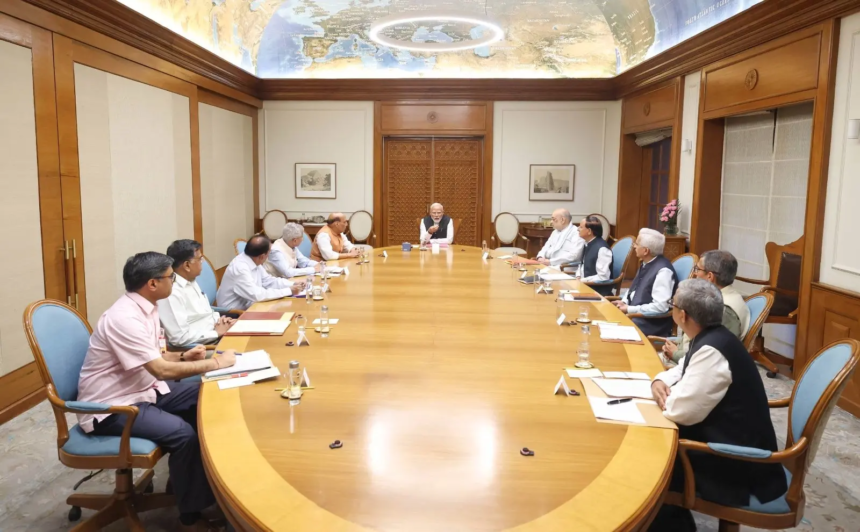In a major diplomatic shift, the Indian government has announced that the 1960 Indus Water Treaty (IWT) with Pakistan will be held in abeyance with immediate effect. This decision was made after a meeting chaired by Prime Minister Narendra Modi, which was convened to discuss critical matters related to national security and bilateral relations. The announcement came on the heels of a review of ongoing tensions between the two countries, particularly Pakistan’s alleged involvement in cross-border terrorism.
The Foreign Secretary confirmed that the suspension of the IWT would remain in place until Pakistan credibly and irrevocably renounces its support for terrorism aimed at India. This move marks a significant departure from previous policies and signals India’s firm stance on tackling issues related to terrorism and its implications on regional peace.
Key Decisions at the CCS Meeting
During the Cabinet Committee on Security (CCS) meeting, five major decisions were taken that underscore India’s determination to safeguard its sovereignty and security. These decisions are likely to have profound implications for India’s relations with Pakistan in the near future.
- Suspension of the Indus Waters Treaty (IWT)
The suspension of the Indus Water Treaty, a vital agreement brokered by the World Bank in 1960, has emerged as a strong statement from India. Under the treaty, the waters of the Indus River and its tributaries were to be shared between India and Pakistan. However, given the rising tensions and concerns over Pakistan’s role in cross-border terrorism, India has decided to put the treaty on hold. The suspension will remain in effect until Pakistan can demonstrate an unwavering commitment to renouncing terrorism. This decision is likely to reverberate across diplomatic channels and is expected to escalate tensions between the two nations. - Closure of Integrated Checkpost at Attari
Another critical decision made during the CCS meeting was the immediate closure of the Integrated Checkpost (ICP) at Attari. This move is a response to the increasingly strained relationship between India and Pakistan. The ICP, which had facilitated trade and travel between the two countries, will now cease operations. However, individuals who have crossed over with valid endorsements will be allowed to return through this route before May 1, 2025. This decision is aimed at reducing cross-border interactions and tightening security. - Revocation of SAARC Visa Exemption Scheme (SPES) for Pakistani Nationals
In a move that further isolates Pakistan, India announced that Pakistani nationals would no longer be permitted to travel to India under the South Asian Association for Regional Cooperation (SAARC) Visa Exemption Scheme. Additionally, all Special Purpose Emergency Service (SPES) visas previously issued to Pakistani nationals have been deemed cancelled. Those currently in India under SPES visas have been given 48 hours to leave the country. This action underscores India’s resolve to curb unwanted infiltration and limit cross-border movement from Pakistan. - Expulsion of Pakistani High Commission Personnel
As part of the response to ongoing tensions, India has declared the Defence, Military, Naval, and Air Advisors in the Pakistani High Commission in New Delhi persona non grata. These officials are expected to leave India within a week. This diplomatic expulsion is a significant step in reducing Pakistan’s influence within India’s capital, particularly in military and defense-related matters. - Withdrawal of Indian High Commission Personnel from Islamabad
Reflecting the reciprocity of the expulsion of Pakistani diplomats, India has decided to withdraw its own Defence, Navy, and Air Advisors from the Indian High Commission in Islamabad. This action, which annuls the relevant positions in the respective High Commissions, reflects the deteriorating state of bilateral relations and India’s desire to recalibrate its diplomatic presence in Pakistan.
Implications for Indo-Pak Relations
These bold decisions signify a stark shift in India’s approach to dealing with Pakistan. The suspension of the Indus Water Treaty is particularly noteworthy, as it impacts one of the world’s most important water-sharing agreements. It also serves as a reminder that India will not tolerate Pakistan’s support for terrorism, and its approach to cross-border terrorism will continue to shape diplomatic interactions between the two countries.
The move to close the Attari Checkpost and revoke the SAARC Visa Exemption scheme is another indicator of India’s growing frustration with Pakistan’s policies. The expulsion of diplomats and the withdrawal of Indian personnel from Islamabad further underline the strained ties between the nations.
As the situation continues to unfold, these actions signal a new chapter in Indo-Pakistani relations, one where India is prepared to take decisive steps to secure its national interests and counter terrorism. The international community will be closely watching the developments, as these decisions could have far-reaching consequences on regional stability.















